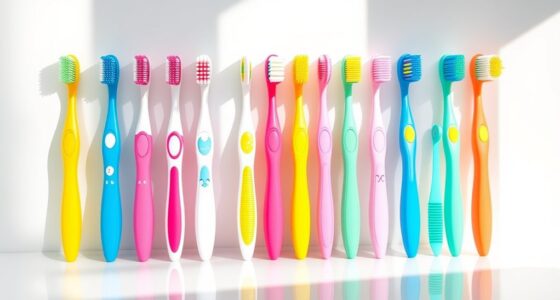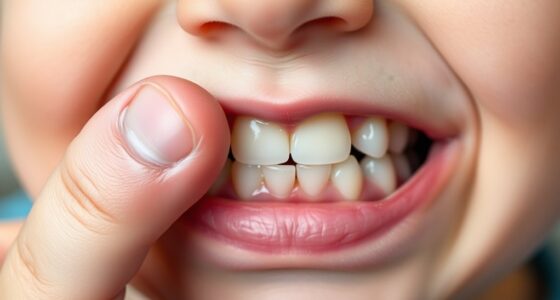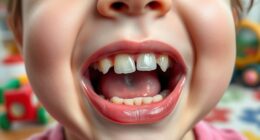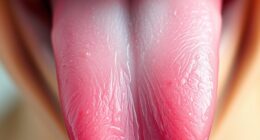Tooth sensitivity in kids happens when the enamel wears down or gums recede, exposing dentin and causing discomfort from hot, cold, or sweet foods. This can result from behaviors like aggressive brushing, sugary or acidic diets, or injuries. Watch for signs like pain while eating or drinking, visible damage, or fussiness. Proper oral hygiene, diet, and regular dental visits can help, and you’ll find more ways to protect your child’s smile as you explore further.
Key Takeaways
- Tooth sensitivity in kids occurs when enamel wears down, exposing dentin and triggering nerve responses to hot, cold, or sweet stimuli.
- Common causes include enamel erosion, cavities, cracked teeth, aggressive brushing, and gum recession.
- Symptoms include sharp pain during eating or drinking, visible enamel damage, and avoidance of certain foods.
- Treatment options involve fluoride applications, gentle oral hygiene, and avoiding acidic foods to strengthen enamel.
- Regular dental check-ups help detect early issues and prevent worsening sensitivity or dental complications.
What Is Tooth Sensitivity?
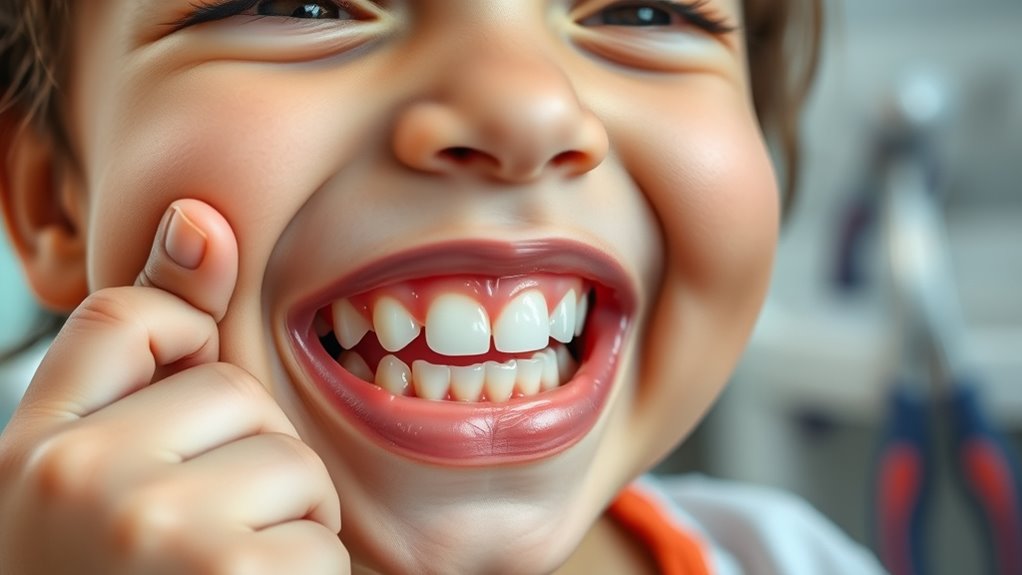
Have you ever felt a sudden sting when you sip something hot or cold? That’s tooth sensitivity. It happens when the protective enamel layer wears down, exposing dentin underneath.
Dentin contains tiny dentinal tubules that connect directly to the nerve inside your tooth. When these tubules are exposed, stimuli like hot and cold foods can trigger a nerve response, causing sharp tooth pain or oral discomfort. Chia seeds, for example, are rich in fiber and antioxidants, which support overall oral health and can help protect enamel when included as part of a balanced diet. Incorporating sound healing techniques has also been suggested to promote relaxation and reduce stress-related oral issues. Additionally, advancements in dental materials aim to better seal and protect exposed dentin, reducing sensitivity.
Factors like enamel erosion, gum recession, or damaged fillings can make your teeth more sensitive. As the enamel thins or wears away, the nerves become more vulnerable to external triggers.
This increased sensitivity results in a tingling or stinging feeling, especially when you consume certain foods or drinks. Understanding this helps you recognize the signs of tooth sensitivity early on.
Common Causes of Tooth Sensitivity in Children

Children can experience tooth sensitivity for several reasons, many of which are linked to common dental issues and habits. One major cause is tooth decay, which weakens enamel and exposes dentin, making teeth more sensitive to hot and cold foods. Poor brushing habits can leave plaque and food particles that irritate gums or expose sensitive areas. Consuming acidic foods and sugary candies erode enamel, increasing discomfort from stimuli. Cracked or chipped teeth from trauma or biting hard objects can also reveal dentin, causing sensitivity. Additionally, emerging adult teeth or the loss of baby teeth may temporarily expose dentin, leading to discomfort. Using proper oral hygiene practices and regular dental check-ups can help prevent some of these issues. An understanding of dental trauma is also important, as injuries can lead to cracks or chips that increase sensitivity. Understanding these causes helps you identify why your child might experience tooth sensitivity and encourages better oral care to protect their teeth.
Recognizing Signs of Sensitive Teeth in Kids

You might notice your child complaining of sharp pain or tingling when they eat or drink hot, cold, or sweet foods. They could also start avoiding certain treats or favoring one side of their mouth while chewing. Additionally, visible discomfort during brushing or flossing can be a clear sign of sensitive teeth. Being aware of oral health issues and how AI-powered tools can analyze symptoms may help in early detection and treatment. Recognizing the importance of dental care routines and maintaining good oral hygiene habits can prevent or alleviate tooth sensitivity. Proper toilet maintenance in preventing oral health problems highlights how keeping bathroom fixtures in good condition can also contribute to overall hygiene. Understanding electric bike features such as speed and power can also help in choosing safer and more suitable options for children’s transportation or recreational activities.
Child Complaints of Pain
Noticing when your child complains of sharp or tingling pain during eating or drinking can be a key sign of tooth sensitivity. Children with sensitive teeth often experience child complaints of pain when consuming hot and cold foods, such as ice cream or hot beverages. They may also show brushing discomfort, avoiding certain areas of their mouth or feeling pain during routine oral care. Children experience tooth pain more frequently around areas of tooth decay or worn enamel, which can heighten tooth sensitivity. Monitoring stool consistency can help identify underlying issues that might contribute to discomfort or other health concerns. Watch for signs like favoring one side of the mouth to chew or avoiding trigger foods that cause discomfort. These reactions indicate that your child’s oral health needs attention to address sensitive teeth and prevent further issues. Additionally, understanding tooth enamel erosion can help parents take preventive steps to protect their child’s teeth from further damage. Recognizing the role of dental trauma is also important, as injuries can contribute to increased sensitivity in children’s teeth. Awareness of alimony laws and how they might impact family dynamics can be beneficial for parents navigating divorce and custody decisions, which can indirectly affect a child’s well-being. Being aware of Kia Tuning options for repairs and upgrades can also be relevant if your child’s dental concerns relate to recent injuries or accidents affecting their teeth.
Avoidance of Certain Foods
When your child avoids certain foods or reacts discomfort when eating, it can be a sign of tooth sensitivity. Children with sensitive teeth often steer clear of hot and cold foods or sugary treats that cause pain. You might notice they pull away from citrus fruits or ice cream, showing a food aversion linked to sensitive teeth. This behavior can result from enamel erosion, which exposes nerves and heightens discomfort. Kids may prefer soft, bland foods to prevent irritation, indicating underlying dental health issues. Recognizing these signs helps you understand their discomfort and encourages better oral hygiene habits. Addressing tooth sensitivity early can prevent further enamel erosion and promote healthier teeth, making mealtimes more comfortable and enjoyable for your child. Additionally, understanding the role of tooth sensitivity in children can help you seek appropriate dental care to protect their developing teeth.
Visible Discomfort During Brushing
Visible discomfort during brushing is a common sign that your child’s teeth may be sensitive. If they grimace, pull away, or cry when brushing, it could indicate tooth sensitivity.
Children with sensitive teeth often experience discomfort from exposure to air or contact, especially around exposed dentin or inflamed gums. They might resist brushing on certain sides or flinch when the brush touches their teeth, signaling pain or tingling sensations.
Poor brushing technique, like aggressive scrubbing, can worsen this sensitivity and cause visible signs such as redness or swelling of the gums. Additionally, tooth sensitivity can sometimes be triggered by seasonal variations, making symptoms more noticeable during certain times of the year. Recognizing these signs early helps you seek appropriate treatment, which may include gentle brushing practices, desensitizing toothpaste, or dental visits. Proper oral hygiene habits can also help prevent further tooth damage and alleviate discomfort.
Addressing visible discomfort ensures your child’s teeth stay healthy and pain-free.
How Tooth Sensitivity Is Treated in Young Patients
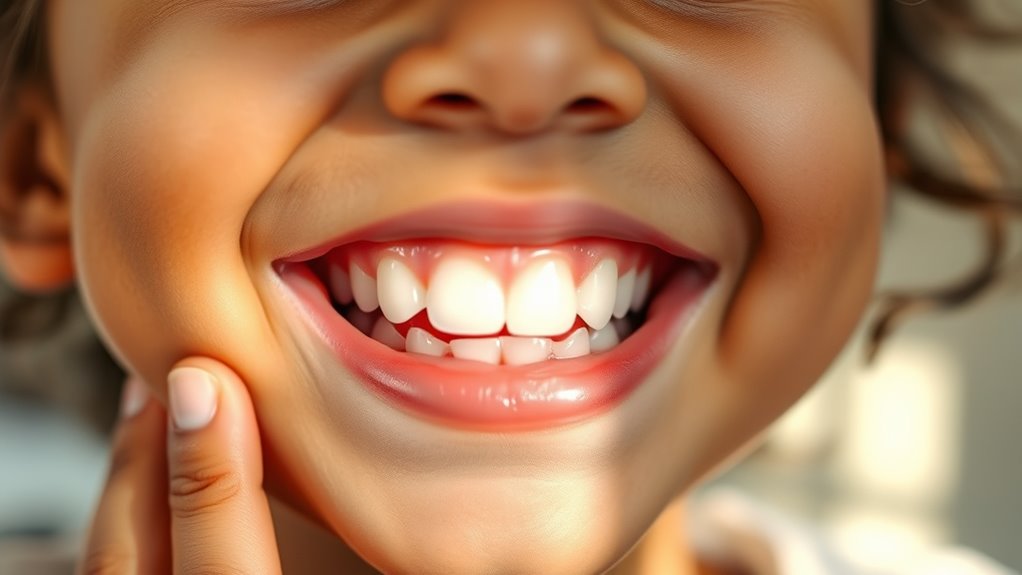
To treat tooth sensitivity in young patients, pediatric dentists often recommend specialized approaches that address the underlying causes and provide relief. They may suggest anti-sensitivity toothpaste formulated for children, which can help reduce discomfort. Fluoride treatments, applied professionally or via mouthwash for kids over six, strengthen enamel and lessen sensitivity. Using a soft-bristled toothbrush and gentle brushing techniques prevents further enamel erosion and gum irritation. For more severe cases, restorative procedures like fillings or crowns cover worn or cracked enamel. Home remedies such as saltwater rinses or avoiding hot, cold, or sugary foods offer temporary relief but should be discussed with your dentist. Incorporating preventive measures can also help minimize future sensitivity issues. Regularly checking equipment maintenance routines ensures optimal performance of dental tools and minimizes the risk of damage that could contribute to sensitivity. Being aware of enamel erosion factors and addressing them early can make a significant difference in managing sensitivity. The table below highlights common treatment options:
| Treatment Type | Purpose | Notes |
|---|---|---|
| Fluoride treatments | Remineralize enamel, reduce sensitivity | Professional or mouthwash use |
| Restorative procedures | Cover worn or cracked enamel | Fillings, crowns |
| Home remedies | Temporary relief | Saltwater rinses, dietary changes |
Preventive Measures to Reduce Sensitivity Risks

You can lower your child’s risk of tooth sensitivity by encouraging good oral hygiene habits, like brushing gently with a soft-bristled toothbrush. Limiting sugary and acidic foods helps safeguard enamel from erosion and reduces dentin exposure. Regular dental check-ups ensure early detection of issues that could lead to sensitivity. Using fluoride treatments can further strengthen tooth enamel and provide additional protection against sensitivity. Being aware of symptoms of dental issues allows for prompt action to prevent worsening of sensitivity. Incorporating glycolic acid products that are formulated for gentle exfoliation can help maintain healthy teeth and gums without causing irritation. Maintaining proper self-watering plant care practices can also contribute to a healthier environment that supports overall oral health by reducing dust and allergens in the home.
Maintain Good Oral Hygiene
Maintaining good oral hygiene is essential for preventing tooth sensitivity in kids. Brushing teeth twice daily with a soft-bristled toothbrush helps prevent enamel erosion and gum recession, which can lead to sensitivity.
Flossing daily removes food particles and plaque between teeth, reducing the risk of cavities and gum disease that expose dentin.
Regular dental check-ups allow you to catch problems like cavities or worn fillings early, preventing them from worsening. Following manufacturer guidelines for air purifier maintenance can also help ensure that any indoor environmental factors contributing to oral health issues are minimized.
Using fluoride toothpaste and mouth rinses strengthens enamel and promotes remineralization, decreasing the chances of teeth sensitivity.
Additionally, replacing your child’s toothbrush every 2-3 months ensures effective cleaning without damaging gums or enamel.
Choosing the right dental products can also support enamel strength and overall protection, contributing to long-term oral health. Incorporating proper brushing techniques can further enhance the effectiveness of oral hygiene routines.
Consistent oral hygiene practices protect your child’s teeth and help maintain overall oral health, reducing sensitivity risks. Developing a routine that includes professional dental advice can provide personalized strategies for your child’s needs.
Limit Acidic Food Intake
Have you ever wondered how the foods your child eats affect their tooth sensitivity? Limiting acidic foods and drinks like citrus, soda, and pickles can protect their enamel from erosion, which exposes dentin and causes sensitivity. Moderation and rinsing with water after consuming acidic items help maintain the pH balance and prevent enamel breakdown. Encouraging children to drink fluoridated water instead of sugary or acidic beverages adds a mineral layer that boosts enamel protection. Avoid frequent snacking on sugary foods, as they increase acid production and weaken dental health. Remember, waiting at least 30 minutes before brushing after acidic foods prevents further enamel wear.
| Acidic Foods | Impact on Dental Health |
|---|---|
| Citrus | Causes enamel erosion |
| Soda | Lowers pH, increases sensitivity |
| Pickles | Contributes to enamel wear |
The Role of Good Oral Hygiene for Sensitive Teeth
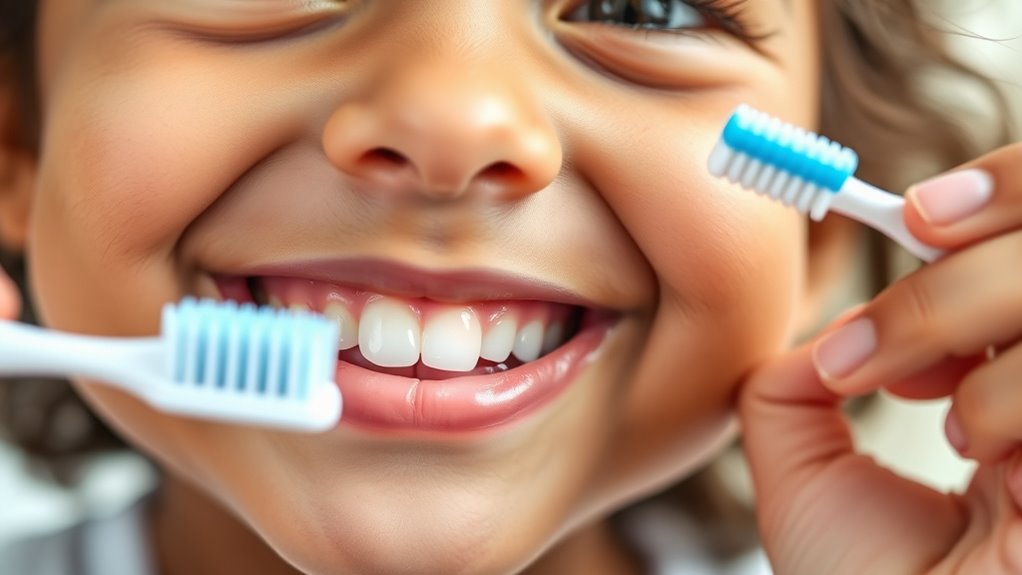
Good oral hygiene plays a crucial role in managing tooth sensitivity in kids by preventing the buildup of plaque and food particles that can irritate exposed dentin. Brushing twice daily with a soft-bristled toothbrush helps remove plaque and debris, reducing irritation.
Good oral hygiene prevents plaque buildup that can irritate sensitive teeth in kids.
Using fluoride toothpaste and mouth rinses strengthens enamel and promotes remineralization, decreasing sensitivity risks.
Flossing daily prevents debris from accumulating between teeth and along the gumline, protecting gum health and preventing cavities that cause discomfort.
Regular dental check-ups allow early detection of issues like cavities or gum recession, which can worsen sensitivity.
Teaching children gentle brushing techniques from an early age ensures effective plaque removal without damaging enamel.
Maintaining good oral hygiene is essential for reducing tooth sensitivity and supporting overall dental health.
Impact of Diet on Tooth Sensitivity
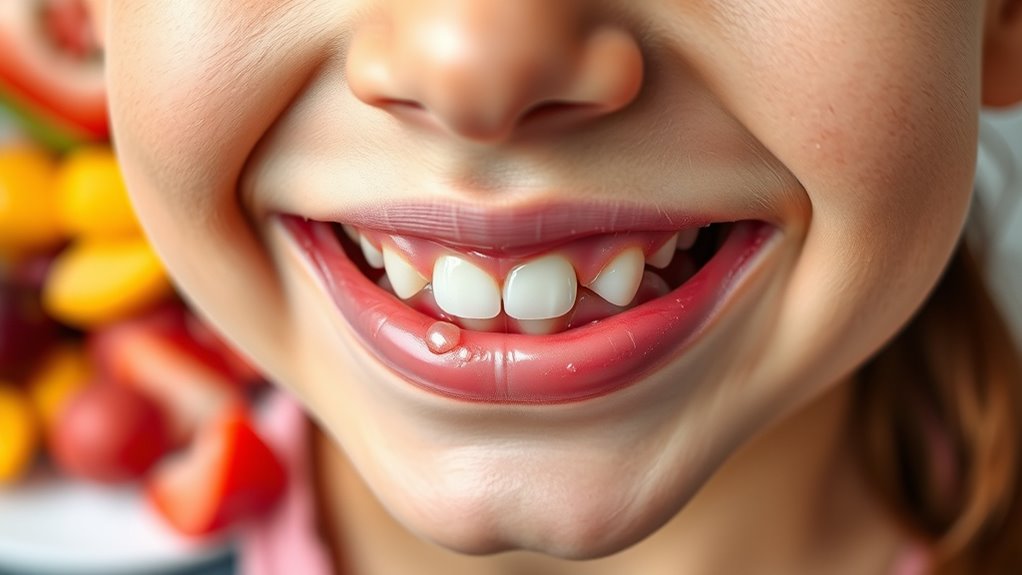
What children eat directly impacts their tooth sensitivity. Consuming too many acidic foods, like citrus fruits and processed snacks, can lead to enamel erosion, making teeth more sensitive.
High sugar intake from candies and sodas also lowers oral pH levels, which weakens enamel and exposes dentin. A diet rich in processed foods and acidic drinks increases the risk of enamel demineralization, heightening sensitivity.
To protect your child’s teeth, encourage a balanced children’s diet that includes calcium and vitamin D, which strengthen enamel. Rinsing with water after meals and drinking fluoridated water can neutralize acids and reduce sensitivity.
Limiting sugary snacks and acidic beverages helps maintain enamel integrity and promotes overall oral health, reducing tooth sensitivity over time.
When to Seek Professional Dental Help

If your child’s tooth sensitivity continues for more than a week despite good oral hygiene, it’s important to schedule a dental visit. Persistent pain or sensitivity may indicate cavities, cracks, or damaged fillings that need professional dental help.
Seek a pediatric dentist if your child experiences severe pain, swelling, or signs of infection alongside sensitivity. Worsening sensitivity or visible issues should prompt a prompt visit to prevent further damage.
Also, watch for behavioral changes like difficulty eating, sleeping, or irritability, which can signal dental problems requiring intervention. Early dental intervention helps address minor issues before they develop into more serious concerns, saving your child discomfort and avoiding extensive treatments later.
Trust a professional to evaluate and provide the appropriate dental help your child needs.
Tips for Maintaining Healthy, Comfortable Smiles

Keeping your child’s smile healthy and comfortable starts with simple daily habits. Regular brushing and flossing with a soft-bristled toothbrush remove plaque and prevent enamel erosion, which can cause tooth sensitivity.
Limit hot and cold foods and drinks to reduce discomfort and protect against enamel wear.
Using fluoride toothpaste and mouth rinses strengthens teeth, making them more resistant to the causes of sensitivity.
Encourage your child to drink fluoridated water and avoid aggressive brushing to maintain healthy dental enamel.
Regular dental check-ups are essential for early detection of issues like cavities or worn fillings that can lead to sensitivity.
Frequently Asked Questions
How Do You Treat Sensitive Teeth in Children?
When your child’s teeth are sensitive, you can help by using toothpaste made for kids that fights sensitivity. Make certain they brush gently with a soft-bristled toothbrush.
You might also consider fluoride treatments from the dentist to strengthen enamel. If the sensitivity persists, consult a pediatric dentist who can recommend treatments like fillings or sealants.
Regular check-ups ensure your child’s teeth stay healthy and comfortable.
How Do I Know if My Tooth Sensitivity Is Serious?
If your child’s tooth sensitivity is persistent, severe, or worsens over time, it could be serious. Watch for signs like pain when eating hot, cold, or sweet foods, visible decay, cracks, or gum recession.
If sensitivity interferes with eating or continues despite home treatments, see a pediatric dentist promptly. Sudden or increasing pain also needs professional evaluation to rule out cavities or nerve issues.
Does Tooth Sensitivity Mean You Need a Root Canal?
No, tooth sensitivity doesn’t necessarily mean you need a root canal. Usually, sensitivity is caused by surface or structural issues that can be treated with desensitizing products, fluoride, or restorations.
A root canal is only needed if the pulp tissue inside the tooth is infected or severely damaged, which is often accompanied by persistent pain or swelling.
If you’re concerned, see your dentist promptly for a proper diagnosis.
Why Does My 5 Year Old Say All My Teeth Hurt?
When your 5-year-old says all their teeth hurt, it’s like a storm brewing inside their mouth. Their tiny, still-developing enamel can’t fully shield against cavities or injuries from falls, making every tooth feel sore.
Sometimes, their erupting permanent teeth cause temporary sensitivity, or poor brushing stirs up gum irritation. You’re seeing a symphony of early dental issues—each note needing attention to calm the storm and protect their smile.
Conclusion
Think of your child’s smile as a delicate garden that needs gentle care. By understanding tooth sensitivity, recognizing signs early, and practicing good habits, you can help keep their teeth strong and comfortable. Just like watering and nurturing plants helps them flourish, regular dental care and healthy habits will guarantee your child’s smile remains bright and pain-free. With a little attention and love, you’re helping their happiness grow, one healthy tooth at a time.




